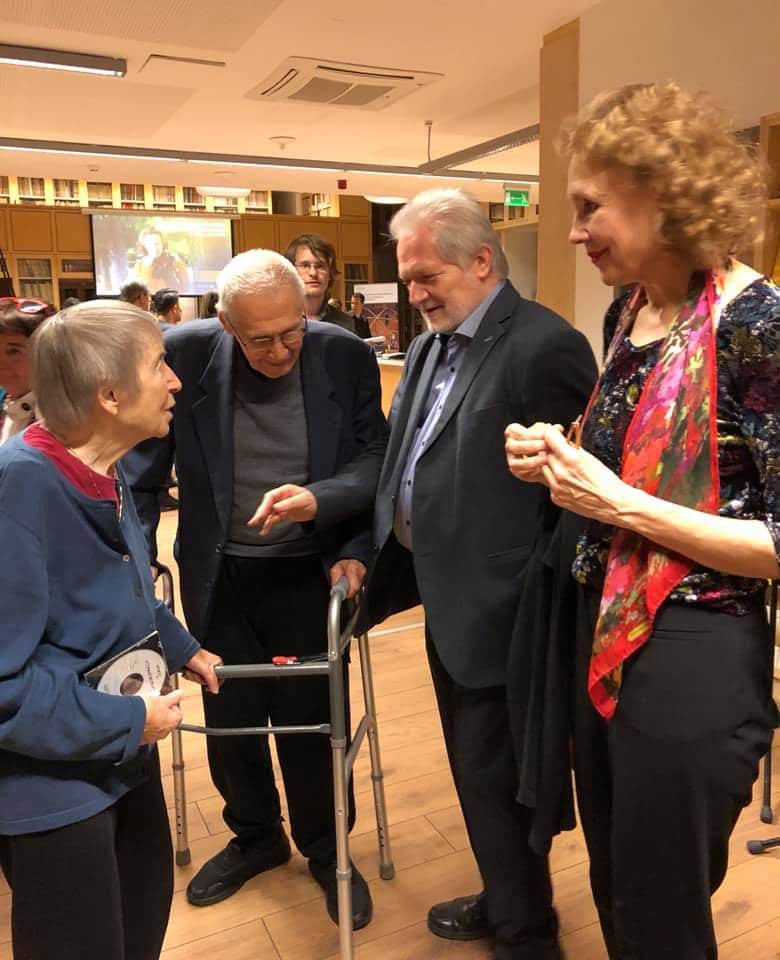Three composers walked into a bar…
main
Last night at Budapest BMC: (l-r) Marta and György Kurtág, Peter Eötvös, Kaija Saariaho (photo: Camilla Hoitenga)


Last night at Budapest BMC: (l-r) Marta and György Kurtág, Peter Eötvös, Kaija Saariaho (photo: Camilla Hoitenga)
A social media activist has circulated a video…

Francesco Meli is due to sing Verdi’s Otello…

Maria Mot’s boutique London-based management has signed the…

Zachary Woolfe, chief music critic of the New…

Session expired
Please log in again. The login page will open in a new tab. After logging in you can close it and return to this page.
They talked about how awful life is and how well they captured that in the music. And how happy they were about that.
You always seem happy on here, John.
Maybe because Norman never has posts about him.
That is, in a literal sense, incorrect, but every time is one too much. It’s difficult enough here.
Sally
Hungary is always high on the list of the world’s most pessimistic countries. And that’s when things are not going too badly.
the only thing that came to my minds after the words “walked into a bar” was an anecdote about Roman gladiator , since this is a classical music blog I hope many know Italian a bit to understand
………………
A Roman Gladiator walks into a bar and asks for a martinus. “You mean a martini?” the bartender asks. The Roman replies, “If I wanted a double, I would have asked for it!”
It’s interesting that Europe’s social democracies maintain a relatively elitist form of modernism, and avoid populist aesthetics — much less social realism. It’s almost counter-intuitive. A “people’s” system of government produces elitist modernism, while the private and market oriented funding system used in the USA, which is centered around a wealthy elite, has a stronger tendency toward populism, though the end result is a pluralism that ranges from populism to elitist European styled modernism.
The explanation for the European aesthetic seems to lie in the state radio and state theaters–a direct manifestation of social democracy. The new music gate keepers are civil servants with well funded programs who specialize in new music and take the specialist views of an elite inner circle centered around modernism that tolerates little aesthetic variation. The system in the USA, by contrast, is poorly funded and unstructured which leads to a random collage of aesthetics, though with a tendency toward market oriented populist postmodernism.
The more varied system in the USA seems to lead to more innovation, and thus concerts that are less predictable and usually more interesting, but it is greatly limited by a lack of funding. The better funded European system is far better for creating large scale productions like complex orchestral pieces and operas, and for large projects like extensive new music festivals. This European system also has the funding to strongly promote its composers and produce recordings, which gives European composers a big advantage over their American colleagues.
A lot of the success of composers like Philip Glass and John Adams who write large scale works is that they have been supported by the European system as a kind of American exotica. If they were European, they probably wouldn’t have been accepted.
Comparisons of the American and European new music worlds are so full of complexities, it’s difficult to draw valid generalizations.
You express a well-known, rather ‘nice’ criticism. The problem I have with this ‘elitist’ form of modernism is that you are assuming that people who achieve ‘esthetic’ experience of junk is a kind of cultural ‘elite’.
Nonetheless, you seem to capture these complexities quite well, they confirm my own experiences and impressions.
The American situation offers, in spite of its problems, more opportunities for new ‘classical’, i.e. non-modernist composers than the European situation, although that is changing a bit in the UK and France, where composers like David Matthews and Nicolas Bacri get regular hearings. The situation in the German lands is much more difficult because of Hitler’s shadow. For instance, the programmer of the [redacted] orchestra in [redacted] has expressed the generally-shared opinion that new music which sounds good, or even beautiful, is not acceptable because it would not reflect contemporary concerns – something straight out of the modernist postwar ideology party book of half a century ago.
http://subterraneanreview.blogspot.com/2015/11/be-liberated.html
I would disagree in the cases you cite.
While Glass accepted Euro commissions for things like Satyagraha, his body of work can never said to be dependent on Euro organizations. He was always a for-profit composer and the founding of his band was a workaround to that system of subsidy and taste-making. After that initial tour of Einstein on the Beach he was personally in debt of $200,000.
Adams has a much more traditional career in that way. Writing in traditional mediums like orchestra and opera as a base for his creativity.
Euro modernism might be on its last legs via this kind of subsidy, but if there happens to be any kind of surplus in innovation in America it certainly doesn’t have to do with where the money comes from but rather from the artists themselves. Orchestras have never been more conservative, as are their benefactors.
Yes, Glass is a for-profit composer in many respects, but he is also one of the most performed living opera composers in the world due to his support by European opera houses.
I see no evidence that European public arts funding is on its last legs. As a rule, it’s as strong as ever.
It’s true that artists are the source of innovation, but a lack of funding can greatly limit their work.
Of course lack of funding puts strong limitations upon artists, in this case: composers. But they can write nonetheless; it is the audience which is then missing-out and readers of SD.
“Three composers walk into a bar – an Englishman, a Welshman, and a Scotsman. The Scotsman says “I’m for a pint!”, and the Welshman says “I’ll join you!”
But then the Englishman says he wants to Leave.
And if an Englishman says he wants to Leave, then everyone has to leave – whether they want to, or not. And just while they were enjoying themselves, too.
Three minimalist composers walk into a bar and order tonic only.
Philip Glass walks into a bar.
“Same again, Mr Glass?”
“Same again, Mr Glass?”
“Same again, Mr Glass?”
But the problem is that the Welshman and the Scotsman are both dwarves, and can’t reach their pints on the bar.